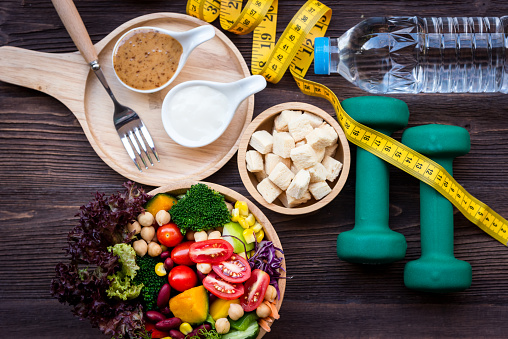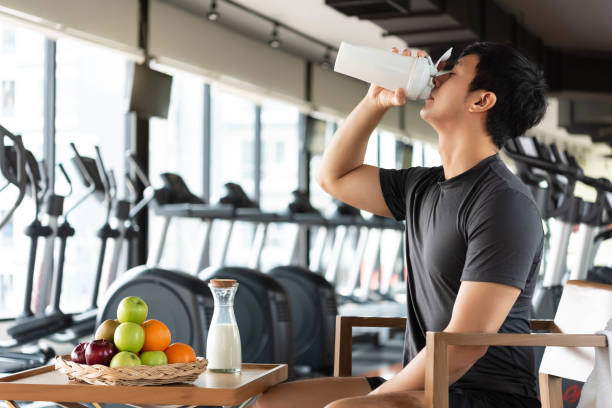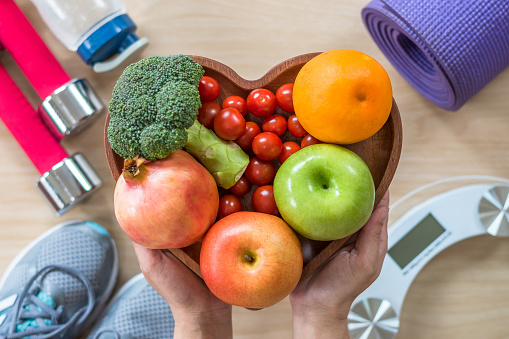Are you someone who struggles to find best pre-workout meal to push through a workout? Or maybe, you feel like you’re not getting the most out of your exercise routine.
If so, then it’s time to focus on what you eat before your workout. The food that you consume before exercising is essential for maximizing your performance and achieving your fitness goals.
In this blog post, we will dive into the importance of a pre-workout meal, what foods to eat, and when to eat them.
By the end of this post, you’ll have all the information needed to create a pre-workout meal plan that fuels your body and helps you reach peak performance.
What is a Pre-Workout Meal?
A pre-workout meal is a meal that is consumed before a workout or exercise session. The purpose of a pre-workout meal is to provide the body with the necessary nutrients and energy to perform the workout at maximum capacity.
The ideal pre-workout meal will vary depending on the individual’s goals, the type of workout, and their personal preferences. Generally, a pre-workout meal should consist of a combination of carbohydrates and protein, as well as some healthy fats. Carbohydrates provide energy, while protein helps to repair and build muscle tissue.
Examples of pre-workout meals include a peanut butter and banana sandwich on whole grain bread, Greek yogurt with fruit and granola, or a smoothie made with protein powder, fruits, and vegetables. It is important to eat the pre-workout meal at least 30 minutes to an hour before exercising to allow enough time for digestion.
The Importance of a Pre-Workout Meal
Fueling your body with the necessary nutrients before a workout can significantly impact your performance. That’s why a pre-workout meal is so crucial. A balanced meal that includes carbohydrates, protein, and healthy fats can provide the necessary fuel for your body to perform at its best during exercise. Carbohydrates help improve endurance and performance, while protein plays a vital role in repairing and recovering muscles after exercise. Timing is also important; aim to eat your pre-workout meal 30 minutes to an hour before exercising. Don’t forget to hydrate as well – drinking water before a workout can improve performance and prevent dehydration.
Why You Need to Fuel Your Workout?
Proper nourishment before your workout is essential for optimal performance. Skipping a pre-workout meal can lead to decreased energy levels, fatigue, and reduced endurance. Eating a balanced meal of carbohydrates, protein, and healthy fats 1-2 hours before exercise provides the necessary fuel for your body to perform at its best. However, timing is crucial – eating too close to exercise can lead to discomfort and digestive issues during your workout. Additionally, proper hydration before your workout is just as important for peak performance.

What to Eat Before Your Workout?
Carbs: The Foundation of a Pre-Workout Meal
Choosing the right carbohydrates for your pre-workout meal is crucial for powering through a high-intensity workout.
Complex carbs are the foundation of a pre-workout meal as they provide sustained energy release, unlike simple sugars that can cause a crash mid-workout. Opt for whole grains and fruits over processed snacks to ensure your body receives the necessary fuel to perform at its best.
Avoid high-fat foods before exercising, as they can slow down digestion and lead to discomfort during your workout. Adding protein to your pre-workout meal will help with muscle recovery and growth while timing is essential – eat your pre-workout meal 1-3 hours before exercising to allow for proper digestion.
Protein: Essential for Muscle Building and Repair
Protein is not only essential for muscle building and repair but also plays a crucial role in overall health. It provides the body with amino acids needed to build and maintain muscles, bones, skin, and organs. Incorporating protein into your pre-workout meal can help prevent muscle breakdown during exercise and promote muscle growth afterward.
When choosing protein sources for your pre-workout meal, aim for high-quality options such as lean meats, poultry, fish, beans, lentils, nuts, and seeds. Additionally, make sure to consume the right amount of protein based on your body weight and exercise intensity.
Healthy Fats: Provide Sustained Energy
Incorporating healthy fats into your pre-workout meal can provide sustained energy for your exercise routine. Unlike simple carbs that release energy quickly, healthy fats take longer to digest and release energy slowly over time.
Adding foods such as avocado, nuts, or seeds to your pre-workout meal can help prevent a mid-workout crash and keep you fueled throughout your workout. It’s crucial to choose the right type and amount of healthy fats based on your individual needs and goals, which is why consulting a nutritionist or dietitian can be beneficial in creating a personalized pre-workout meal plan.
Timing Your Pre-Workout Meal
Timing your pre-workout meal is crucial to ensure that you have enough energy for your exercise routine. Eating too close to your workout can cause indigestion, while consuming a heavy meal too far in advance can leave you feeling sluggish. The timing of your pre-workout meal depends on the size and composition of the meal.
Larger and more complex meals should be consumed at least 2-3 hours before exercise to allow for digestion, while smaller, simpler meals or snacks can be eaten closer to the workout time. It’s important to experiment with different timing strategies and find what works best for your individual needs and goals.
How Long Before Your Workout Should You Eat?
The ideal time to eat a pre-workout meal containing carbohydrates and protein is between 30 minutes to 3 hours before exercising. It’s important to experiment with different timing strategies to determine what works best for your body and workout routine.
The Ideal Amount of Food to Consume Before Your Workout
Finding the ideal amount of food to consume before your workout can be a challenging task. It depends on several factors such as your body composition, fitness goals, and the intensity of your workout.
- A general guideline is to eat a meal containing 300-500 calories with a balance of carbohydrates and protein. Timing is also crucial as you want to allow enough time for digestion before exercising.
- Consuming too much food too close to your workout can cause discomfort or sluggishness, while eating too little can leave you feeling hungry or low on energy.
Experiment with different pre-workout meals and timing to find what works best for your body.
Pre-Workout Meal Ideas for Different Goals
For Weight Loss
A pre-workout meal for weight loss should be low in calories and high in protein and fiber, with moderate amounts of carbohydrates. The goal is to provide sufficient energy for the workout while promoting fat-burning.
Smoothies made with berries, spinach, and Greek yogurt or a small serving of quinoa salad with grilled chicken or tofu are excellent options. It’s essential to avoid fatty foods that can slow down digestion and make you feel sluggish during your workout. Drinking plenty of water before and during exercise can help support weight loss goals and keeps you hydrated throughout the workout.
For Muscle Building
If you’re looking to build muscle, a well-rounded pre-workout meal can help maximize your gains. A balanced meal that includes both protein and carbohydrates is important for providing the energy and nutrients needed to fuel your muscles during exercise.
- Good sources of protein include chicken, fish, eggs, or plant-based options like tofu or beans.
- For carbohydrates, consider sweet potatoes, brown rice, or whole-grain bread.
Be sure to consume the meal at least 30 minutes before your workout to allow time for digestion and optimal nutrient absorption. By properly fueling your body with a pre-workout meal, you’ll be better equipped to reach your muscle building goals.

For Energy
When it comes to feeling energized during your workout, the pre-workout meal you consume can make all the difference. By choosing the right combination of foods, you can fuel your body with the energy and nutrients it needs to power through your exercise routine.
To ensure optimal results, focus on eating complex carbohydrates and protein, such as fruits and nuts or a smoothie made with Greek yogurt and berries. Avoid consuming high-fat or high-fiber foods that can leave you feeling sluggish during your workout. Remember to give your body sufficient time to digest by eating at least 30 minutes prior to exercising.
For Women’s Health
When it comes to a pre-workout meal for women’s health, it’s important to focus on balanced nutrition that provides energy and supports muscle growth. A combination of carbohydrates and protein can help achieve these goals.
- Some examples of pre-workout meals for women include Greek yogurt with granola, oatmeal with fruit and nuts, or a smoothie with protein powder and berries.
- It’s also important to avoid consuming high-fat foods before exercising as they can cause stomach discomfort and slow down digestion. Drinking plenty of water before the workout is crucial to staying hydrated and maintaining optimal performance.

Supplements to Consider Before Your Workout
Creatine
Creatine is a popular and well-researched supplement that has been shown to increase muscle strength and power. It works by increasing the amount of creatine phosphate in muscles, providing energy during high-intensity exercises. Studies have also found that creatine supplementation before exercise can improve performance and increase lean body mass.
Beta-Alanine
Supplements can be a great way to take your workout to the next level. Beta-Alanine is one such supplement that’s gained popularity in recent years for its ability to improve endurance and reduce fatigue during high-intensity workouts. The science behind Beta-Alanine involves increasing carnosine levels in the muscles, which helps to buffer lactic acid build-up and delay muscle fatigue. Research has shown that taking 2-5 grams per day can significantly improve exercise performance, particularly during short-duration, high-intensity activities like sprinting or weightlifting. However, it’s important to consult with a healthcare professional before adding any new supplements to your routine and always follow recommended dosages.
Caffeine
Caffeine is a widely used pre-workout supplement that has been shown to improve exercise performance by enhancing focus and energy levels. However, it’s important to be mindful of the amount consumed as high doses can lead to unwanted side effects like jitters, anxiety, and insomnia. It’s recommended to start with a low dose of caffeine and gradually increase as needed.
Branched-Chain Amino Acids (BCAAs)
BCAAs are a popular supplement for individuals looking to improve their exercise performance and promote muscle growth and recovery. These essential amino acids play a vital role in protein synthesis and can help reduce muscle soreness, fatigue, and damage caused by intense workouts. By supplementing with BCAAs before your workout, you may experience improved endurance, reduced muscle breakdown, and enhanced recovery post-workout.
Whey Protein Powder
Whey protein powder is a popular and effective supplement for athletes and fitness enthusiasts. It contains all nine essential amino acids that our body needs to build and repair muscle tissue after exercise. Consuming whey protein before your workout can improve muscle performance, reduce muscle damage, and support overall recovery.
Let’s Sum Up
A pre-workout meal is essential to fuel your workout and maximize its benefits. It helps you maintain energy levels, prevent muscle breakdown, and improve performance. A combination of carbs, protein, and healthy fats is ideal for a pre-workout meal. Timing is also crucial, as eating too close to your workout can lead to digestion issues and eating too early can leave you feeling hungry during the session.
If you’re looking to enhance your performance further, consider incorporating supplements like creatine, beta-alanine, caffeine, BCAAs, or whey protein powder into your routine.
Fuel up smartly before hitting the gym!!!



